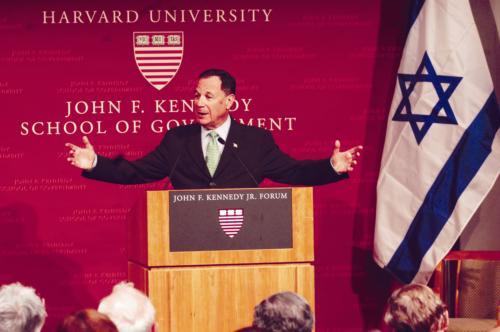Israel’s Ambassador to the United Nations, Dan Gillerman—the first Israeli to be appointed to the position from the private sector—presented an optimistic outlook for the ongoing Israeli-Palestinian conflict in an animated talk at the Institute of Politics last night.
Gillerman, establishing a lively atmosphere at the onset with his sense of humor and oratory ease, delved deep into the contentious issues of the conflict by outlining specific measures needed to be undertaken by both sides of the conflict. Gillerman said that these included the need for global recognition of the conflict and a clearer understanding of the region and its people.
“What we are witnessing today is not a clash of civilizations, but rather, a clash of civilization, in the singular,” he said.
Having gained business acumen as the CEO of several Israeli companies in a wide spectrum of economic sectors, Gillerman has been a key leader in establishing economic cooperation with Palestinian and Arab leaders and called upon leaders from around the world to grant Palestine, “legitimacy, leadership, and business.”
“We need to increase the opportunities for Palestinians,” Gillerman said of business development. “They can turn Gaza into the Hong Kong of the Middle East if their leaders choose to do that instead of turning it into a launching pad for terrorism.”
Affirming his belief that there is sufficient hope for Palestinians, Gillerman called upon the establishment of visionary Palestinian leaders and the recognition of these leaders by the rest of the world.
“We have been made hostages to our dreams for long enough,” he said. “I believe most Palestinians want peace, but a Palestinian leader brave and courageous to say enough is enough needs the legitimacy of the Arab world.”
Gillerman specifically highlighted the need for outsiders to view the region from a different perspective. Stating the need for “healthy dialogue” on campuses, he argued that outsiders would be more eager to see change in the region if Israel’s government highlighted the country’s positive attributes.
“As Israelis, we should try to bring awareness to others about the country we really are,” he said. “Let’s stop being a one-issue mission [and instead] highlight Israel’s creativity, innovation, its pubs, its youth, and determination to make life better,” he said. “They should know we’re normal.”
Talking about a number of growing problems in the region, Gillerman specifically criticized the Iranian government for perpetuating the growing “culture of violence.”
Emphasizing the gravity of the situation, he offered personal accounts of the violence occurring on both sides and presented a sobering comparison to an attentive audience.
“A cup of coffee in Paris can cost you four dollars,” he said. “However, a cup of coffee in Jerusalem, in Haifa, in Tel Aviv, could cost you the lives of four children.”
Although Gillerman presented the unique dangers of the region, his optimistic outlook remained throughout his presentation, placing his faith in the abilities of both Israeli and Palestinian leaders to rise to the occasion.
“[Palestine] will find in Israel a partner who is willing to go a very long way with them to bring solace and peace to the very tough neighborhood we live in,” he said. “Great opportunities arise in moments of great crisis.”
Read more in News
Law School Students Protest Abortion Decision













